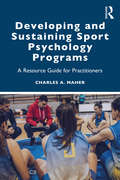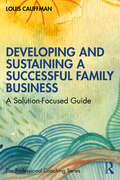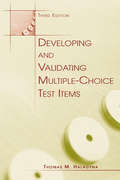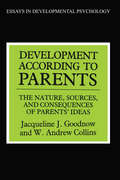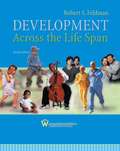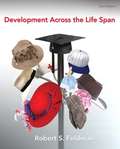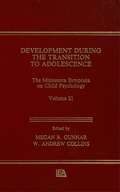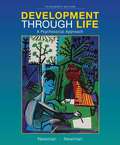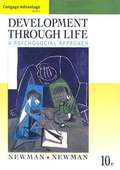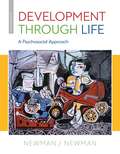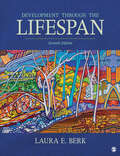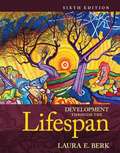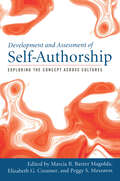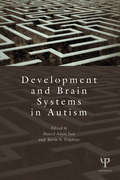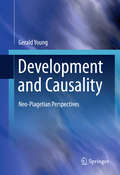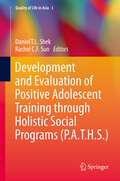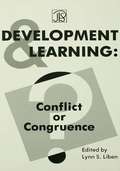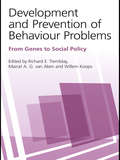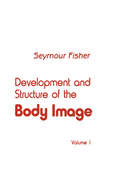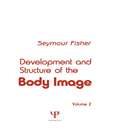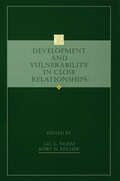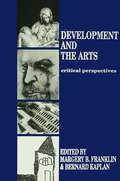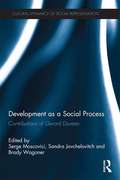- Table View
- List View
Developing and Sustaining Sport Psychology Programs: A Resource Guide for Practitioners
by Charles A. MaherDeveloping and Sustaining Sport Psychology Programs: A Resource Guide for Practitioners outlines a systemic approach to creating comprehensive, sustainable sport psychology programs in professional sports organizations, colleges, universities, and at secondary school levels. Based on the author’s more than 30 years of professional experience, this volume presents a framework that delineates methods for designing, implementing, and evaluating sport psychology programs, discussing topics such as needs assessment and client identification. Featuring real-world experiences and clear, non-technical writing, this step-by-step guide can be applied to a range of sport psychology programs including mental skills, life skills, coach education, leadership training, and team development programs. Developing and Sustaining Sport Psychology Programs details a program development process that has been applied successfully at the professional, collegiate, and secondary school levels over a more than 30-year period. It has contributed to the development of sport psychology programs that have sustained themselves over the course of time and is an essential text for sport psychologists and mental skills coaches at all levels as well as graduate students and other professionals in the field.
Developing and Sustaining a Successful Family Business: A Solution-Focused Guide
by Louis CauffmanThis practical and important book offers ideas, examples, and suggestions that address the challenges inherent to developing and sustaining a successful family business. It explores the complex dynamics involved in working with loved ones and how to pass a business on to a new generation. Structured around the story of a family that has built a successful enterprise, now facing the issues of succession, the book utilizes the solution-focused model to provide step-by-step instructions to creating good working relationships and orienting toward common goals while building trust, respect, and love. Complete with summaries, toolkits, and case studies, this book is an essential read for any member of a family business, as well as those who provide services to family businesses, including coaches, consultants, and non-family employees.
Developing and Validating Multiple-choice Test Items
by Thomas M. HaladynaThis book is intended for anyone who is seriously interested in designing and validating multiple-choice test items that measure understanding and the application of knowledge and skills to complex situations, such as critical thinking and problem solving. The most comprehensive and authoritative book in its field, this edition has been extensively
Developing and Validating Multiple-choice Test Items
by Thomas M. HaladynaThis book is intended for anyone who is seriously interested in designing and validating multiple-choice test items that measure understanding and the application of knowledge and skills to complex situations, such as critical thinking and problem solving. The most comprehensive and authoritative book in its field, this edition has been extensively
Development According to Parents: The Nature, Sources, and Consequences of Parents' Ideas (Essays in Developmental Psychology)
by W. Andrews Collins Jacqueline J. GoodnowTo their everyday life with children, parents bring a number of ideas about development and about parenting. Some of these ideas are about their own children and about themselves as parents. Others are more general: ideas, for instance, about what babies are like, how children change with age, what kinds of affection and control they need, the responsibilities of mothers and fathers, or the degree of influence each parent has over the way a child develops. Moreover, the ideas that parents hold, shape their actions with children and the way they assess both their children and their own performance as parents. With the recognition of parental thinking as a powerful factor in family life, research has turned to the study of this `everyday' or `informal' psychology. Some of the studies deal with the nature of parents' ideas: What ideas are held? Which are most widely shared? How do these ideas differ from one another? Some deal with the sources of parents' ideas: with the factors that give rise to differences among parents from different backgrounds (different cultures, different economic groups, different degrees of experience with children). Others concentrate on the consequences of parents' ideas for themselves and for children. This monograph summarizes the research with an eye to several audiences (researchers, clinicians, educators) and with an emphasis on the questions that remain. A major goal is to point not only to significant gaps, but also to some specific ways in which they might be addressed by further research.
Development Across The Life Span
by FeldmanThis chronologically organized book provides readers with a broad overview of the field of human development--from the moment of conception through death--focusing on physical, cognitive, and social and personality development. Appealing to individuals with a myriad of different backgrounds and future goals, this book offers the most current, balanced coverage of theory and research. A wide variety of chapter topics includes gene therapy; brain development, post-partum depression; child care effects; home schooling; cognitive developments, stability of personality; cultural approaches to development, and attitudes toward aging and length of life. For a better understanding of the experiences of life and development of humans.
Development Across the Life Span (Sixth Edition)
by Robert S. FeldmanRobert Feldman offers students a chronological overview of physical, cognitive, social, and emotional development-from conception through death with his text Development Across the Lifespan . The text presents up-to-date coverage of theory and research, with an emphasis on the application of these concepts by students in their personal-and future professional-lives. The text taps into students' inherent interest in the subject of human development, encouraging them to draw connections between the material and their own experiences. This book is available with MyDevelopmentLab, which includes a full eText, videos, self-tests, flashcards, and MyVirtualChild- the interactive simulation which allows you to raise a virtual child from birth to age 18, and monitor the effects of your parenting decisions. MyDevelopmentLab does not come automatically with the text so please be sure you check to ensure that an access code is included before placing your order! (The book by itself has a different ISBN number than the book + MyDevelopmentLab. ) You can also purchase a MyDevelopmentLab access code online at www. mydevelopmentlab. com Visit the Feldman preview website to view a sample chapter! www. pearsonhighered. com/showcase/feldman What to know more? Click here to visit the publisher's website and learn more about this book and what's new in this 6th edition: http://www. pearsonhighered. com/educator/product/Development-Across-the-Life-Span/9780205805914. page
Development During the Transition to Adolescence: The Minnesota Symposia on Child Psychology, Volume 21 (Minnesota Symposia on Child Psychology Series #Vol. 21)
by W. Andrew Collins Megan R. GunnarResearch on the processes of change during the transition from middle childhood to adolescence has been a relatively neglected area of scholarship until recently. This volume, features prominent researchers who provide integrative accounts of their research programs, focusing on processes of physical, social, and cognitive change during this important transition period in development. Also included in this volume is an overview, discussion, and critical analysis of core conceptual issues in the study of adolescent transition.
Development Through Life: A Psychosocial Approach
by Barbara Newman Philip NewmanHuman development is fascinating. This text uses a life-stage approach to present development across the life span, drawing on the psychosocial theory of Erik Erikson to provide a conceptual framework. The authors address physical, intellectual, social, and emotional growth in 11 life stages, from the prenatal period through elderhood, focusing on the idea that development results from the interdependence of individuals and their environments at every stage, and placing special emphasis on how optimal development may be fostered throughout life. They also provide many cases that show you how research and theories can be applied to contemporary issues, the diversity of experiences that are possible at a certain period of life, and how people cope with challenges they face at various points in life.
Development Through Life: A Psychosocial Approach (10th edition)
by Barbara M. Newman Philip R. NewmanDesigned for an undergraduate course in human development, this textbook describes the physical, intellectual, social, and emotional growth that occurs in each of 11 life stages. Its psychosocial approach emphasizes the continuous interaction and integration of individual competencies with the demands and resources of the surrounding culture. The ninth edition features a new chapter on death, dying, and bereavement. A glossary of terms completes the volume.
Development Through Life: A Psychosocial Approach (Twelfth Edition)
by Barbara M. Newman Philip R. NewmanNewman and Newman use a chronological approach to present development across the life span, drawing on the psychosocial theory of Erik Erikson to provide a conceptual framework for the text. The authors address physical, intellectual, social, and emotional growth in all life stages, focusing on the idea that development results from the interdependence of these areas at every stage, and placing special emphasis on optimal development through life.
Development Through The Lifespan
by Laura E. BerkNow published by SAGE! With its seamless integration of up-to-date research, strong multicultural and cross-cultural focus, and clear, engaging narrative, Development Through the Lifespan, by best-selling author Laura E. Berk, has established itself as the market’s leading text. Known for staying current, the fully updated Seventh Edition offers the latest, most relevant research and applications in the field of human development. New and compelling topics, rich examples, coupled with Berk’s signature storytelling style, makes this edition the most accessible and engaging text available to students today. Included with this title: LMS Cartridge: Import this title’s instructor resources into your school’s learning management system (LMS) and save time. Don’t use an LMS? You can still access all of the same online resources for this title via the password-protected Instructor Resource Site. Learn more.
Development Through The Lifespan
by Laura E. BerkNow published by SAGE! With its seamless integration of up-to-date research, strong multicultural and cross-cultural focus, and clear, engaging narrative, Development Through the Lifespan, by best-selling author Laura E. Berk, has established itself as the market’s leading text. Known for staying current, the fully updated Seventh Edition offers the latest, most relevant research and applications in the field of human development. New and compelling topics, rich examples, coupled with Berk’s signature storytelling style, makes this edition the most accessible and engaging text available to students today. Included with this title: LMS Cartridge: Import this title’s instructor resources into your school’s learning management system (LMS) and save time. Don’t use an LMS? You can still access all of the same online resources for this title via the password-protected Instructor Resource Site. Learn more.
Development Through the Lifespan (6th Edition)
by Laura E. BerkLaura Berk's Development Through the Lifespan is relied upon in classrooms worldwide for its clear, engaging writing style, exceptional multicultural and cross-cultural focus, cutting-edge consideration of the interrelationships between heredity and environment, rich examples, and long-standing commitment to presenting the most up-to-date scholarship. This new edition continues to offer students research-based practical applications that they can relate to their personal and professional lives. Laura Berk, renowned professor and researcher, has revised the text with new pedagogy, a heightened emphasis on the interplay between heredity and environment, and an enhanced focus on many social policy issues, while emphasizing the lifespan perspective throughout. The latest theories and findings in the field are made accessible to students in a manageable and relevant way. Berk's signature storytelling style invites students to actively learn beside the text's "characters." Students are provided with an especially clear and coherent understanding of the sequence and underlying processes of human development, emphasizing the interrelatedness of all domains--physical, cognitive, emotional, social--throughout the text narrative and in special features. Berk also helps students connect their learning to their personal and professional areas of interest. Her voice comes through when speaking directly about issues students will face in their future pursuits as parents, educators, health care providers, social workers, and researchers. As members of a global and diverse human community, students are called to intelligently approach the responsibility of understanding and responding to the needs and concerns of both young and old. While carefully considering the complexities of human development, Berk presents classic and emerging theories in an especially clear, engaging writing style, with a multitude of research-based, real-world, cross-cultural, and multicultural examples. Strengthening the connections among developmental domains and of theory and research with applications, this edition's extensive revision brings forth the most recent scholarship, representing the changing field of human development.
Development and Assessment of Self-Authorship: Exploring the Concept Across Cultures
by Marcia B. Baxter Magolda Elizabeth G. Creamer Peggy S. MeszarosThis book brings together new scholarship that expands and refines the concept of self-authorship across cultures. It adopts a constructive-developmental approach to self-evolution that emphasizes the interaction of personal characteristics and contextual influences on individuals’ construction of knowledge, identities, and relationships. Individual chapters cover subjects from populations as varied as Dutch students, male and female Bedouin and Jewish adolescents, African American male and female adolescents in economically depressed areas of the US, Latino/a college students grappling with ethnic identity and dissonance, Australian college females preparing to be childcare workers, and finally a comparative study of Japanese and U.S. college students’ epistemic beliefs.The book concludes by addressing questions about the challenges and opportunities involved in developing a valid measure of self-authorship that is less time and expertise-intensive than the in-depth one-on-one interview employed until now; and offering an outline of future theoretical and methodological research needed to further our understanding of self-evolution in general and self-authorship in particular.
Development and Brain Systems in Autism (Carnegie Mellon Symposia on Cognition Series)
by Kevin A. Pelphrey Marcel Adam JustThis volume covers several perspectives on autism which bring together the most recent scientific views of the nature of this disorder. A number of themes organize major developments and emerging areas in autism: Cognitive and neural systems development: how autism arises in the behavior and thought of very young children. Discovering brain mechanisms underlying social and cognitive deficits in autism: how we can explain "social awkwardness" and poor language comprehension in terms of malfunctions of brain mechanisms, revealed by fMRI studies of people with autism. Integrating information about genes, brain, and biological mechanisms with behavioral evidence. Linking the science of autism with lives lived: how the new information about autism impacts people with autism and real-world considerations.
Development and Causality
by Gerald YoungThis book sets forth a new model of development from a causal perspective. As this is an area vital to several disciplines. It has been written at multiple levels and for multiple audiences. It is based on the work of Piaget and Neo-Piagetians, but also covers other major models in development. It has elements that make it attractive as a teaching text, but it is especially research-focused. It has clinical applications. It presents many new ideas and models consistent with the existing literature, which is reviewed extensively. Students, researchers, and practitioners should find it useful. The models presented in the present work build on models introduced in prior publications (e.g., Young, 1990a, 1990b; 1997).
Development and Evaluation of Positive Adolescent Training through Holistic Social Programs (P.A.T.H.S.)
by Daniel T.L. SHEK Rachel C. SunThis book outlines the development, implementation and evaluation of a project entitled "P.A.T.H.S. to Adulthood: A Jockey Club Youth Enhancement Scheme," with P.A.T.H.S. denoting Positive Adolescent Training through Holistic Social programmes. This pioneer project was conducted in Hong Kong between 2005 and 2012 with more than 210,000 participants. Its goal was to help students meet various challenges in their path to adulthood, with a focus on their psychosocial competencies, developmental assets and the promotion of healthy peer relationships. The project was initiated by The Hong Kong Jockey Club Charities Trust in collaboration with the Government's Social Welfare Department, Education Bureau and five universities in Hong Kong. Edited by the researchers of the project, Development and Evaluation of Positive Adolescent Training through Holistic Social Programs explores the nature of positive youth development (PYD), the application of PYD constructs to youth programs and implementation issues. Using multiple strategies, the book evaluates the overall effectiveness of the P.A.T.H.S. school-based programme and reveals that stakeholders had positive perceptions of the project, its implementers and benefits. Students in the program showed better positive development and displayed lower levels of substance abuse and delinquent behaviour than students in the control schools. The book also details lessons learned, emergent issues, future directions as well as insights into the development of positive youth development programs particularly in Chinese communities. Development and Evaluation of Positive Adolescent Training through Holistic Social Programs will appeal to all educators, administrators, psychologists, social workers and allied profeesionals looking to promote whole-person development in their students, especially those with in interest in education in China.
Development and Learning: Conflict Or Congruence? (Jean Piaget Symposia Series)
by Lynn S. LibenThis volume juxtaposes two different domains of developmental theory: the Piagetian approach and the information-processing approach. Articles by experts in both fields discuss how concepts of development and learning, traditionally approached through cognitive-developmental theories such as Piaget's, are analyzed from the perspective of a task analytic, information-processing approach.
Development and Prevention of Behaviour Problems: From Genes to Social Policy
by Richard E. TremblayThis book brings together world leading researchers from diverse fields to explore the potential causes of the development of behaviour problems. The book presents theories that hope to influence public health, education and social policy in the prevention of the costly social troubles that behaviour problems can cause. Featuring contributions from researchers whose backgrounds range from the social and behavioural sciences to economics, the varied chapters assesses the potential role of gene–environment interactions, biological factors and gender differences in the development of behaviour problems. The book includes a review of studies that attempt to understand why antisocial behaviour is concentrated within families, and concludes with three chapters that link developmental research directly with policy issues. It provides a framework for students, scientists, educators and care givers to understand where frontier research on behaviour problems is going and how it can be applied in the social, educational and health services. This collection will interest all students of psychology and the behavioural sciences as well as those with an interest in public policy, sociology, abnormal psychology, psychopathology and personality disorders.
Development and Structure of the Body Image: Volume 1
by S. FisherFirst published in 1986. Routledge is an imprint of Taylor & Francis, an informa company.
Development and Structure of the Body Image: Volume 2
by S. FisherFirst published in 1986. Routledge is an imprint of Taylor & Francis, an informa company.
Development and Vulnerability in Close Relationships (Jean Piaget Symposia Series)
by Gil G. Noam Kurt W. FischerHow do people develop in their important relationships? How do two people come together to form a new, close relationship? How do relationships affect or determine who we are and who we become? These questions should be central to the study of mind and development, but most researchers neglect relationships and focus instead on analyses of individuals, as if people were basically alone, experiencing occasional fleeting moments with other people. Research based on this individualist assumption has dominated the behavioral and clinical sciences, but there are other voices, and they are growing. In this book, many of the scholars who are moving relationships and attachments back to the center of human development outline their central concepts, findings, and perspectives. People are fundamentally social, and relationships are part of the fabric of being human, forming an essential foundation that molds each person's mind and action. A mind does not reside in one person but in relationships and communities, composed of many people's interconnected minds, which mutually support and define each other. From the start and throughout life, each person develops strengths and vulnerabilities in important relationships in communities and cultures. Those relationships are so central to each person's activity and experience that without them, no scientific explanation can even begin to analyze mind and action. There is no mind without other people. There is no psychological vulnerability that does not involve others. The contributors to this book aim to establish a firm foundation for the role of relationships in human activity and health and to promote strong research by bringing together in one place most of the best research and theory on development and relationships. Their goal is to stimulate a more radical inclusion of relationships in mind, an ecological focus on the ways that relationships constitute action, feeling, and thought.
Development and the Arts: Critical Perspectives
by Margery B. Franklin Bernard KaplanThis volume's unifying theme is the question: Is a concept of development relevant to art? Bringing together contributions from the perspectives of philosophical aesthetics, psychoanalysis, architecture and design, and the practicing artist, as well as developmental theory in psychology, this volume provides a unique assembly of voices from different disciplines. The twelve chapters span artistic production in childhood, transformations in the work of the individual artist, and historical changes in art, thus establishing a broad canvas for examining how concepts of development are used in relation to the arts. The contributors consider specific phenomena and questions against the background of theoretical issues, taking markedly different views on whether change in artistic work can be aptly characterized as development and, if so, what modulations of the concept may be required in light of accompanying assumptions and implications. Given the nature of this discourse, this richly illustrated book should lead to a radical rethinking among those who apply developmental concepts to artistic phenomena and aesthetic movements, and to reconsideration of the role of art in optimal human development within the individual and within social orders.
Development as a Social Process: Contributions of Gerard Duveen (Cultural Dynamics Of Social Representation Ser.)
by Brady Wagoner Sandra Jovchelovitch Serge MoscoviciThis volume discusses the interface between human development and socio-cultural processes by exploring the writings of Gerard Duveen, an internationally renowned figure, whose untimely death left a void in the fields of socio-developmental psychology, cultural psychology, and research into social representations. Duveen's original and comprehensiv
